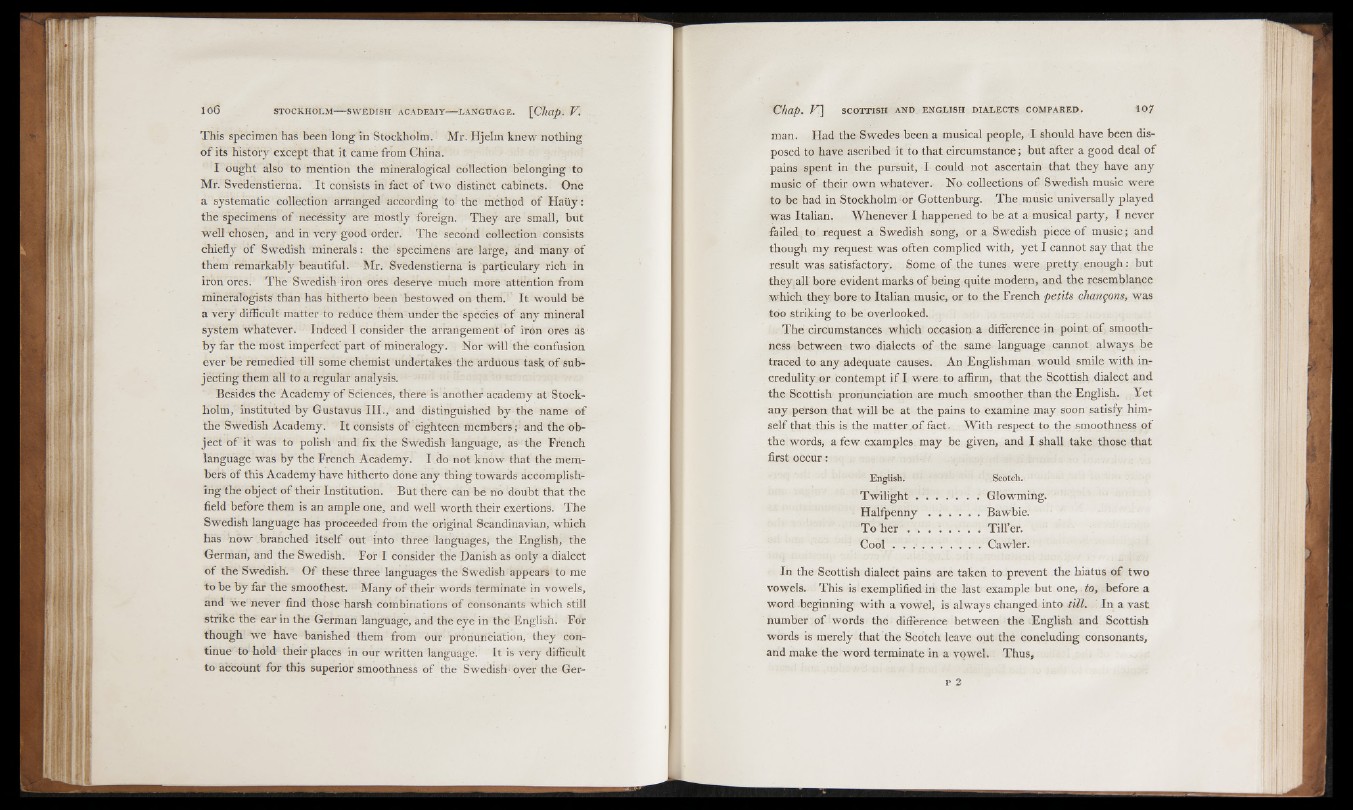
This specimen has been long in Stockholm. Mr. Hjelm knew nothing
of its history except that it came from China.
I ought also to mention the mineralogica! collection belonging to
Mr. Svedenstierna. It consists in fact of two distinct cabinets. One
a systematic collection arranged according to the method o f Haüy:
the specimens o f necessity are mostly foreign. They are small, but
well chosen, and in very good order. The second collection consists
chiefly o f Swedish minerals: the specimens are large, and many of
them remarkably beautiful. Mr. Svedenstierna is particulary rich in
iron ores. The Swedish iron ores deserve much more attention from
mineralogists than has hitherto been bestowed on them. It would be
a very difficult matter to reduce them under the species o f any mineral
system whatever. Indeed I consider the arrangement of iron ores as
by far the most imperfect' part of mineralogy. Nor will thé confusion
ever be remedied till some chemist undertakes the arduous task of subjecting
them all to a regular analysis.
Besides the Academy o f Sciences, there is another academy at Stockholm,'
instituted by Gustavus III., and distinguished by the name of
the Swedish Academy. It consists o f eighteen members ; and the object
b f it was to polish and fix the Swedish language, as the French
language was by the French Academy. I do not know that the members
of this Academy have hitherto done any thing towards accomplishing
the object of their Institution. But there can be no doubt that the
field before them is an ample one, and well worth their exertions. The
Swedish language has proceeded from the original Scandinavian, which
has now branched itself out into three languages, the English, the
German, and the Swedish. For I consider the Danish as only a dialect
of the Swedish. Of these three languages the Swedish appears to me
to be by far the smoothest. Many of their words terminate in vowels,
and we never find those harsh combinations of consonants which still
strike the ear in the Gerihan language, and the eye in the English. For
though we have banished them from our pronunciation, they continue
to hold their places in our written language. It is very difficult
to account for this superior smoothness of the Swedish-over the German.
Had the Swedes been a musical people, I should have been disposed
to have ascribed it to that circumstance; but after a good deal o f
pains spent in the pursuit, I could not ascertain that they have any
music o f their own whatever. No collections of Swedish music were
to be had in Stockholm or Gottenburg. The music universally played
was Italian. Whenever I happened to be at a musical party, I never
failed to request a Swedish song, or a Swedish piece o f music; and
though my request was often complied with, yet I cannot say that the
result was satisfactory. Some o f the tunes were pretty enough: but
they,all bore evident marks of being quite modern, and the resemblance
which they bore to Italian music, or to the French pefits changons, was
too striking to be overlooked.
The circumstances which occasion a difference in point of smoothness
between two dialects of the same language cannot always be
traced to any adequate causes. An Englishman would smile with incredulity
or contempt i f I were to affirm, that the Scottish dialect and
the Scottish pronunciation are much smoother than the English. Yet
any person that will be at the pains to examine may soon satisfy himself
that this is the matter of fact. With respect to the smoothness of
the words, a few examples may be given, and I shall take those that
first occur:
English. Scotch..
Twilight ................ Glowming.
Halfpenny . . . . . . Bawbie.
To her . . . . . . . . Tiller.
; Cool . . . . . . . . . . Cawler.
In the Scottish dialect pains are taken to prevent the hiatus o f two
vowels. This is exemplified in the last example but one, to, before a
word beginning with a vowel, is always changed into till. In a vast
number o f words the difference between the .English and Scottish
words is merely that the Scotch leave out the concluding consonants,
and make the word terminate in a vowel. Thus,